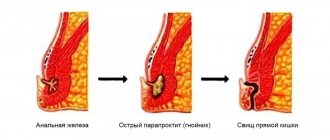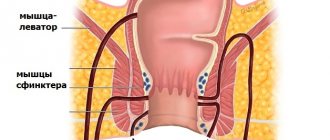Colon cancer is a name that unites a whole group of malignant diseases of the large intestine. Currently, there are many types of cancer, which differ in the type of growth of malignant cells, location, size and prognosis for the patient.
Thus, malignant neoplasms are found in:
- rectum;
- cecum;
- colon.
Depending on the type of cancer and possible prognosis, the doctor prescribes appropriate treatment. In most cases, the task of doctors is to remove the tumor in a timely manner. It is important to prevent metastasis and reduce the risk of relapse.
At CELT you can get a consultation with a proctologist.
- Initial consultation – 3,000
- Repeated consultation – 2,000
Make an appointment
Causes and risk factors for anal cancer
The main cause leading to the development of anal cancer is considered to be HPV - human papillomavirus. HPV infection occurs in 9 out of 10 patients with anal cancer.
Risk factors also include:
- HIV infection;
- immunosuppressive conditions, for example, after organ transplantation;
- homosexuality;
- anal sex;
- frequent change of sexual partners;
- smoking.
Cervical cancer is not a risk factor, but often accompanies anal cancer, as it can also be a consequence of HPV infection.
List of sources
- Tsukanov A.S., Shelygin Yu.A., Achkasov S.I., Frolov S.A., Kashnikov V.N., Kuzminov A.M., Pikunov D.Yu., Shubin V.P. Principles of diagnosis and personalized treatment of hereditary forms of colorectal cancer. Bulletin of the Russian Academy of Medical Sciences. — 2019
- Association of Oncologists of Russia. Practical recommendations for drug treatment of patients with colon cancer. — 2014
- V.V. Martynyuk. Colon cancer (morbidity, mortality, risk factors, screening). St. Petersburg Medical Academy of Postgraduate Education. — 2000
Signs of Anal Cancer
The first symptoms of anal cancer are easily confused with other diseases of the rectum, for example, hemorrhoids, so patients often do not realize the full danger of the disease and do not consult a doctor in a timely manner.
Symptoms to be wary of:
- sensation of a foreign body in the anus;
- pain in the anal area;
- itching and burning in the anus;
- drops of blood after bowel movements or in stool;
- anal bleeding.
As the disease progresses, maceration (wetting) in the anus is observed, ulcerations appear, and the inguinal and perianal lymph nodes become enlarged. In advanced stages, when the anal sphincter is involved in the process, fecal incontinence develops. Also, women can develop rectovaginal fistulas, and when anal cancer grows into the urethra and prostate in men, urinary disorders can occur. The general condition suffers - the patient loses appetite, loses weight, and becomes weak.
You should seek medical help when the first symptoms of anal cancer appear in order to make a correct diagnosis and begin treatment on time.
Symptoms
Unfortunately, for the patient and the doctor, the early stages of the disease often have no symptoms, which makes it difficult to diagnose the tumor and timely start of treatment.
As colorectal cancer develops, it acquires the following clinical symptoms:
- Alternation of chronic constipation and diarrhea;
- Bloody issues. Observed in almost 70% of patients;
- The discharge is purulent and mucous;
- Intestinal obstruction;
- Anemia of unknown etiology;
- Pain in the lower abdomen;
- "Ribbon" chair.
As the disease progresses, the following are observed:
- Loss of appetite;
- Malaise;
- Muscle weakness;
- Drowsiness;
- Significant weight loss;
- Decreased hemoglobin;
- Brittle hair and nails.
Classification of the disease
In most cases (70-80%) anal tumors are squamous cell carcinoma. Adenocarcinoma develops in 10-15% of cases, other tumors account for no more than 3-5%.
In turn, squamous cell (cloacogenic) cancer is divided into:
- large cell non-keratinizing;
- large cell keratinizing;
- basaloid.
Adenocarcinoma of the anal canal can be of the intestinal type, and also develop from the anal glands and rectal fistula.
Rare types of anal cancer include:
- small cell carcinoma;
- poorly differentiated cancer;
- neuroendocrine tumors;
- melanoma of the anal canal;
- non-epithelial tumors;
- unclassified neoplasms;
- secondary tumors.
Stages of anal cancer
To stage cancer, the TNM classification is used, in which T is the size of the tumor, N is the condition of the regional lymph nodes, M is the presence of distant metastases.
TNM classification
| Tumor size | ||
| T | Tx | there is no way to evaluate the primary tumor |
| T0 | no signs of a primary tumor | |
| Tis | cancer in situ | |
| T1 | less than 2 cm | |
| T2 | from 2 to 5 cm | |
| T3 | more than 5 cm | |
| T4 | any size, the tumor grows into neighboring organs | |
| Regional lymph nodes | ||
| N | Nx | it is not possible to evaluate regional lymph nodes |
| N0 | there are no metastases in regional lymph nodes | |
| N1 | there are metastases in perirectal lymph nodes | |
| N2 | metastasis to the unilateral internal iliac and/or inguinal nodes | |
| N3 | metastases are determined in the perirectal and inguinal lymph nodes and/or bilateral internal iliac and/or inguinal lymph nodes | |
| Distant metastases | ||
| M | Mx | there is no way to assess the presence of distant metastases |
| M0 | none | |
| M1 | present | |
Clinical staging
In addition, there is clinical staging based on the most significant component of the TNM classification. According to him, the following stages of the disease are distinguished:
- 0 – tumor in situ, no involvement of regional lymph nodes or distant metastases;
- I – tumor up to 2 cm, no metastases in regional lymph nodes and distant organs;
- II – tumor from 2 to 5 cm or more than 5 cm, without damage to regional lymph nodes and distant metastases;
- IIIA – tumor less than 2 cm, from 2 to 5 cm, more than 5 cm, regional lymph nodes are affected, there are no distant metastases, or a tumor of any size with invasion of nearby organs and tissues without affecting regional lymph nodes and distant metastases;
- IIIB – tumor less than 2 cm, from 2 to 5 cm, more than 5 cm, regional lymph nodes affected at the N2-3 level, or a tumor of any size with invasion into nearby organs and tissues and damage to regional lymph nodes at stage N1;
- IV – distant metastases are present with any size of the primary tumor or its absence/impossibility to assess, and with any degree of involvement (its absence) of regional lymph nodes.
Diagnosis of anal cancer
When a patient first approaches, the doctor collects an anamnesis of life and illness and conducts an initial examination. The doctor will find out whether the patient has a family history of cancer, what concomitant pathologies he suffers from, how long ago the symptoms for which the patient is seeking treatment appeared, and will ask to describe the complaints in detail.
The initial examination includes:
- general examination – height, weight, skin, mucous membranes, lymph nodes;
- examination of the perianal area - the presence of tumor growths on the skin, fistulas, weeping areas, ulcers;
- palpation of the inguinal lymph nodes - their consistency, enlargement, adhesion to each other and to the underlying tissues;
- digital examination of the rectum - clarification of the presence, location, size of the tumor;
- for women - examination by a gynecologist to exclude the spread of the process to the back wall of the vagina, screening for cervical cancer (Pap smear).
The examination plan also includes tests and instrumental studies. These include:
- detailed clinical and biochemical blood test;
- blood test for tumor markers (the types of tumor markers required are determined by the doctor depending on the suspicion of a particular tumor);
- electrocardiography;
- X-ray or computed tomography of the chest;
- Ultrasound or CT with intravenous contrast of the abdominal organs;
- endoanal ultrasound (using a thin probe about 30 cm long) or MRI of the pelvic organs, which evaluates the size of the tumor, the depth of its germination, involvement of the anal sphincter in the process, changes in the perirectal lymph nodes;
- colonoscopy with biopsy and further examination of biopsy material;
- if necessary, biopsy of inguinal lymph nodes.
Treatment of anal cancer
Treatment tactics are developed taking into account several factors: the type and size of the tumor, the stage of its detection, the size of the affected part of the anus, the depth of penetration of the tumor, the presence or absence of metastases, damage to the lymph nodes, age, general condition of the patient, and the presence of concomitant diseases.
For treatment, one of the methods or a combination of them can be used:
- excision within healthy tissue or laser ablation (not all clinics practice);
- radiation or radiotherapy;
- chemotherapy;
- extensive surgery;
- palliative therapy.
The standard of treatment is radiation or combined chemoradiotherapy of the tumor and inguinal lymph nodes. Squamous cell carcinoma of the anal canal has high radiosensitivity, so the use of radiation therapy makes it possible to eliminate the tumor and at the same time preserve the obturator function of the anal sphincter.
In addition to radiation therapy, chemotherapy may be prescribed with drugs in tablet form or by intravenous administration. Chemotherapy, in addition to directly affecting the tumor, affects metastases in the inguinal lymph nodes, but has many side effects and is difficult to tolerate by patients.
Radiation therapy is also indicated for recurrent tumors in the pelvic lymph nodes (if it has not been performed previously). If radiotherapy in such a situation is ineffective, lymph node dissection is performed - removal of the lymph nodes along with the tumor and subcutaneous tissue at the site of its formation.
In the early stages, with carcinoma in situ, local excision of the tumor within healthy tissue is possible, without affecting the sphincter.
Extended surgical intervention is indicated for patients with morphologically verified tumor recurrence or its continued growth after chemoradiotherapy. It is carried out no earlier than 24 weeks after completion of chemoradiotherapy. In such cases, abdominal-perineal extirpation of the rectum is performed with a colostomy on the anterior abdominal wall.
Original surgical technique
Resection and extirpation are carried out on the basis of an operation - total mesorectal excision - TME. To prevent the appearance of satellite metastases when isolating the rectum in the traditional way, when the lymph nodes located in the mesorectum remain unremoved, I perform the operation through laparoscopic access. This technique allows us to reduce the development of local relapses to a minimum; in our clinic this figure does not exceed 5% (instead of 45%).
Our clinic is equipped with the most modern equipment and instruments, for example, to prevent stricture or failed anastomotic suture after treatment, staplers are used during surgery, mobilization of the intestine is performed bloodlessly thanks to the use of the LigaSure electrothermal tissue ligation device, etc.
Considering that removing part of the intestine onto the abdominal wall can negatively affect the psychological state of the patient, I strive to perform organ-preserving operations, if possible. Therefore, during surgical treatment, my goal is to maintain the continuity of the intestine and anal sphincter, as well as gentle surgery to preserve the nerve structures in the intervention area. If the formation of an anastomosis is impossible, and placing a temporary intestinal stoma on the abdominal wall is the only correct solution, then after a few months the patient can undergo reconstructive surgery, which makes it possible to return to the person’s usual method of bowel movement.
Disease prognosis
The prognosis of survival for anal cancer largely depends on the stage at which the tumor is detected, as well as the involvement of regional lymph nodes in the process. The histological form of the tumor affects survival to a lesser extent.
When a tumor with a diameter of less than 3 cm is detected and chemoradiotherapy is administered in a timely manner, cure is achieved in 80% of patients, while relapses occur in less than 10%.
Surgical treatment allows you to achieve stable remission: a five-year survival rate of 55-70% of patients in the absence of metastases in regional lymph nodes, 20% - if they are present.
It was noted that the prognosis is worse for men, and the disease is more severe and has a worse prognosis in smokers and those infected with HIV.
Prevention of anal cancer
To prevent the occurrence of anal cancer, you should first of all observe sexual hygiene - avoid frequent changes of sexual partners, use condoms, do not practice anal sex, periodically be examined for the presence of sexually transmitted infections, and promptly treat them if detected.
A healthy lifestyle, giving up alcohol and smoking, and supporting the immune system will be useful in the prevention of any diseases, including malignant tumors.
If you detect any suspicious symptoms - pain in the anus, mucous or bloody discharge, feeling of a foreign body - you should contact a proctologist. An annual colonoscopy for preventive purposes is recommended annually for all people over 45 years of age.
After treatment for anal cancer, patients are under the supervision of a proctologist or oncologist. In the first 1-2 years, it is recommended to visit a doctor who will determine the required scope of examination every 3-6 months. During the period of 3-5 years - 1-2 times a year. After 5 years from the date of treatment, annual consultations with a doctor or contacting a doctor if complaints arise.
The information in this article is provided for reference purposes and does not replace advice from a qualified professional. Don't self-medicate! At the first signs of illness, you should consult a doctor.
Booking Health helps you get treatment abroad
If you want to find out prices for treatment of colon cancer in Germany, treatment of colon cancer in Israel or other countries, contact the medical tourism operator Booking Health. Fill out the “Send a request” form on the company’s website, and a medical consultant will contact you on the same day.
Booking Health specialists will also help you with such important points:
- Choosing the right clinic based on the annual qualification profile
- Direct communication directly with the attending physician
- Preliminary preparation of a treatment program without repeating previously conducted examinations
- Ensuring favorable prices for clinic services, without surcharges and coefficients for foreign patients (savings up to 50%)
- Make an appointment for the desired date
- Control of the medical program at all stages
- Assistance in purchasing and shipping medications
- Communication with the clinic after completion of treatment
- Control of invoices and return of unspent funds
- Organization of additional examinations
- Service of the highest level: booking hotels, plane tickets, transfers
- Translator and personal medical coordinator services











